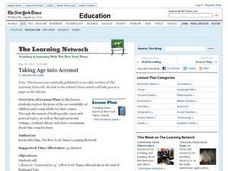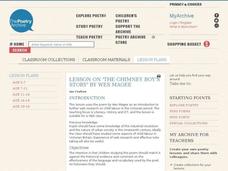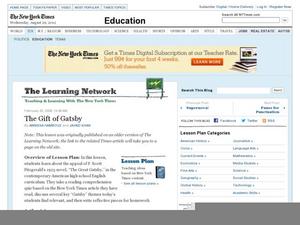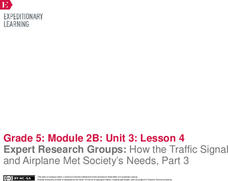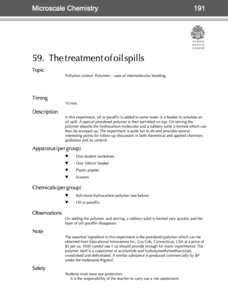Curated OER
Taking Age into Account
Have your class consider the issue of minors' accountability for their crimes. They discuss specific cases and the general issue of juvenile crime in round table discussions. Use this lesson to emphasize the rules and individual roles...
Newseum
E.S.C.A.P.E. Junk News
Fair, balanced, and reputable information? There's an acronym for that! Scholars learn the E.S.C.A.P.E. method for evaluating news sources. Then, pupils work in small groups to read and analyze a news story and discuss the activity to...
Curated OER
A Discourse on the History of Language
Analyze and make inferences from the information used by linguists to construct the evolution of languages. They research different dating techniques to explain how scientists infer age with evidence.
Scholastic
Ready to Research Owls
Researching facts about owls can be a hoot for your class. Let them wisely collaborate on this writing project. The resource is the second part of three parts. It is best to use all three lessons in order.
Curated OER
In Katrina's Wake
You will need to go to the National Center for Biotechnology Information website to obtain the article, "In Katrina's Wake." Have your class read it and examine maps of where toxic chemicals were located in Louisiana at the time,...
Curated OER
Lesson on 'The Chimney Boy's Story' by Wes Magee
Wes Magee's poem "The Chimney Boy's Story" about chimney sweeps/climbing boys is used as an introduction to a lesson that asks groups to research child labor in Victorian Britain.
Curated OER
Mini Research Report
Sixth graders select a topic to research. They gather information from at least 3 sources and take notes according to the categories chosen. Students write a rought draft using the notes. They edit, revise and publish the information....
Curated OER
Korean History Through Journaling
Students explore Korea and details about the Choson Kingdom. In this Korea lesson plan, students examine the geographical location of Korea. Students also take notes on a lecture about the Choson Kingdom and relations between Japan...
Curated OER
Why a Bill of Rights? What Impact Does it Have?
Learners explore the Bill of Rights. In this Bill of Rights instructional activity, students compare the Federalist view of government to the Anti-Federalist view of government. Learners consider the impact of the bill of rights as they...
Curated OER
Human Body Series - Respiratory System
Elementary schoolers play a respiratory relay toss in order to take in the respiratory system! They also create their own question cards based on several kid-friendly online articles about breathing and the health of the lungs. They use...
Curated OER
The Gift of Gatsby
A reading of “Gatsby’s Green Light Beckons a New Set of Strivers,” a New York Times article by Sara Rimer, triggers a discussion of the American Dream and what it means to strive for something. Following the discussion, class members...
Curated OER
Search Warranted?
Young readers work on evaluating claims in a piece of informational text with the article "In New York, It's Open Bag or Find Exits" from the New York Times. They analyze current search procedures implemented to fight terrorism...
EngageNY
Deepening Your Research
Give credit where credit is deserved. Scholars discuss what makes a credible source as they take a look at "An Apparel Factory Defies Sweatshop Label, but Can It Thrive?" Learners read the article to look for answers to the research...
EngageNY
Research: Paraphrasing Relevant Information
Readers take a look at the source Ethical Style: How Is My T-Shirt Made? and discuss how to say the information in the article without plagiarism. Learners make note of and underline sentences that may present a problem in paraphrasing....
PBS
Interviewing: The Art of Asking Questions
Interviewing skills are important, even outside of a news reporter's desk or employer's office. Take your class through the process of interviewing people they don't know with a set of case studies featuring journalists and various...
Teach Engineering
Exploring Bone Mineral Density
Bone up on bone density. The second installment of the seven-part series has pupils read articles on two different websites to learn about bone density and its measurement, as well as X-rays and other imaging tools. A quiz assesses their...
EngageNY
Introducing Module 4B: “Water Is Life”
Learners take a gallery walk around the classroom to view various images and quotes. As they walk, they write down what they notice and wonder about what they see. After discussing their notice and wonder notes, they read the...
The New York Times
Collateral Damage? Researching a Connection Between Video Games and Violence
Hook your class into an exploration of and discussion about violence in video games with a cute animal clip and a video game trailer. After a quick discussion about how media can affect mood, class members read a related article and...
Nemours KidsHealth
Food Allergies: Grades 3-5
In a creative writing and health assignment, your pupils will write a letter on behalf of an immune system to apologize for causing a food allergy, while also identifying what food allergies are and what types of foods can cause them.
Constitutional Rights Foundation
Naturalized Citizens and the Presidency
Article II, Section 1 of the U.S. Constitution takes center stage in a lesson that asks class members to assume the role of state senators, debate a resolution to amend the U. S. Constitution to permit naturalized citizens to run for...
EngageNY
Expert Research Groups: How the Traffic Signal and Airplane Met Society’s Needs, Part 3
Pupils work in expert research groups, reading an informational article about an invention and completing a note-catcher worksheet. Afterward, scholars work in triads to answer questions based on the text.
Nemours KidsHealth
Car and Bus Safety: Grades K-2
Nearly every child will ride in a car or take a bus during their elementary career, that's why it is so important to teach them safety skills. First, little ones discuss why safety rules are important. Then, they go over rules that will...
Royal Society of Chemistry
The Treatment of Oil Spills—Microscale Chemistry
When oil spills happen, how is the oil cleaned up? Pupils of polymer science discover an amazing substance that turns oil into a solid during a microscale experiment. Individuals observe oil or paraffin before and after addition of the...
Curated OER
There's a World of Science to Read Today!
Learners read a current science article. They write a summary of the article, take notes, write and edit a summary, and print their work.


